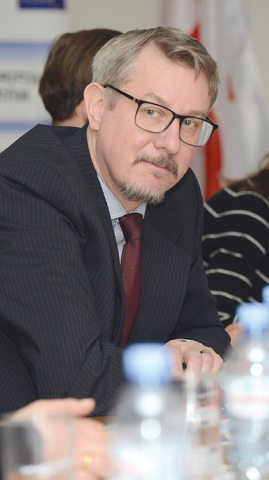Georgia On the Runway: the Country's Aspiration, Potential & Perspectives
Op-Ed
Georgia has taxied out onto the metaphorical runway and is ready for lift-off. That is the feeling I get after six months at the helm of the EU Delegation to Georgia. Georgia is currently the undisputed reform champion of the Eastern Partnership region, a fact that is reciprocated by an unprecedented level of EU political engagement and economic assistance to this country. EU-Georgia relations have never been more intense than they are right now.
The EU is Georgia's biggest trade partner and almost half of Foreign Direct Investments to Georgia come from the European Union. Georgia's exports to the EU have grown steadily since the Deep and Comprehensive Free Trade Area (DCFTA) entered into force in 2014. The DCFTA also helps in pushing a much broader agenda of economic modernization, equipping this small and open economy to compete successfully on the global market. With its geographic location, Georgia is in an excellent position to link up trade between Europe and Asia as well as in the region.
Through EU-Georgia visa liberalization, launched in 2017, more than 300,000 Georgian citizens have already taken the opportunity to travel visa-free to Europe, and programmes like Erasmus+, Horizon 2020 and Creative Europe are contributing to boosting people-to-people contacts.
With a wealth of culture, history, traditions, wine and culinary specialities, and wonderful nature and landscapes ideal for trekking in the summertime and for skiing in the wintertime, Georgia has huge potential as a unique and attractive tourism destination as well as exporter of niche products to Europe and beyond. The President and government have rightly put cultural diplomacy high on the agenda, which will undoubtedly assist in building up Georgia's brand name further.
But for Georgia to successfully get airborne and reap the benefits of its potential, it still needs to clear the tarmac of a number of obstacles and risks. With around 20% of the population still living in poverty, an uneven distribution of wealth between Georgia's regions, and many Georgians left out of the job market, more efforts need to go into the government's stated objectives of 'inclusive economic growth', de-centralization, jobs creation and education reform. Without such investments in Georgia's human capital, not only will there be bottlenecks to economic growth, but eventually also a risk to sustained popular support for further reforms.
Moreover, without continued, ambitious efforts in key areas such as judicial reforms, including in the judiciary itself, and the fight against high-level corruption, a strong societal contract in Georgia will not emerge, nor will Georgia become a truly attractive place for investments. These challenges are well-known here, but it will still require a strong political will to set the course right. The same goes for addressing the shortcomings of past election processes, including last year's presidential elections, where I hope that, through concerted legislative and other efforts this year, Georgia will be better positioned to face the parliamentary elections in 2020.
With every year that passes, Georgia is growing incrementally better and stronger. With every year, more Georgian citizens are broadening their horizons and taking ownership of their own fate, their own potential and that of their country. With every year, Georgia is better prepared to handle its regional challenges, and to embrace its opportunities. And given that there is an almost national consensus on where Georgia should be heading, towards Europe, through further democratic and economic reforms, objectively, little stands in the way of Georgian politicians from all camps to unite around this objective, thus making sure that the trajectory set already some 25 years ago, becomes irreversible. We are now at a point in time when it is time to clear the last rubble from the tarmac and take Georgia to the skies!
The Georgian version of this article was printed in the Georgian version of The Economist’s The World in 2019 edition.
By EU Ambassador Carl Hartzell











